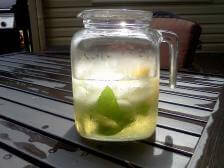Iced Tea Danger: How Much Is Too Much?
Recently, a man went into kidney failure after drinking too much iced tea. Could you be at risk? How much iced tea is it safe to drink? Nutrition Diva explains.
Monica Reinagel, MS, LD/N, CNS
Listen
Iced Tea Danger: How Much Is Too Much?

The case, which was reported in a letter to the editors of the New England Journal of Medicine, involved a middle aged man who went to the hospital in pretty bad shape and eventually ended up on dialysis. The doctors were initially perplexed about the cause of the kidney failure but eventually concluded that it was “almost certainly due to excessive consumption of iced tea.”
Iced Tea: How Much Is Too Much?
The guy reported drinking about a gallon of iced tea every day – which is a considerable amount but by no means unheard of. Those of you who live in the southern United States, for example, know what I’m talking about. If everyone who drinks a gallon of iced tea a day were to end up in kidney failure, there wouldn’t be enough dialysis machines in the Northern Hemisphere to handle the demand.
In fact, that’s precisely why this case ended up in the New England Journal of Medicine: it was a surprising and unusual event. Nonetheless, the doctors speculate that tea consumption could be an under-recognized factor in kidney disease. They encouraged other doctors to ask patients with unexplained kidney problems about their tea consumption.
Why Would Tea Hurt Your Kidneys?

See also: Can Drinking Tea Cause Kidney Stones?
How much is too much? The average person takes in between 150 and 500 mg of oxalates per day – and people whose diets are high in vegetables, whole grains, soy, and other legumes probably fall toward the top of the range.
The patient in this unusual case was getting around 1500 mg per day, just from his tea – and that was clearly too much for his kidneys. That doesn’t mean it would be too much for your kidneys. Some people are simply more prone to forming kidney stones than others. In fact, general population studies have found no relationship between the amount of oxalates in the diet and the risk of kidney stones.
See also: Can Drinking Tea Cause Iron Deficiency?
Even if you’re not prone to kidney stones, there may be a couple of other reasons to rein in your tea consumption. Depending on where it’s grown and how it’s processed, tea can also be high in fluoride. A little fluoride is a good thing but – as with almost anything – too much fluoride can cause problems.
The tannins in tea can also block the absorption of iron – especially the type of iron found in vegetables. This is probably only a concern for vegetarians who drink a large amount of tea every day and with every meal.
Tea Also Has Health Benefits
But let’s not forget about the many benefits of tea: It’s high in a unique class of antioxidants. Regular tea consumption may lower your risk of heart disease and the caffeine it contains appears to protect against Parkinson’s and Alzheimer’s.
How Much Tea Can You Safely Drink?
So, taking all this into consideration, is it possible to come up with some sort of guideline for how much tea is too much? There are no official recommendations on this one. But for most healthy people. I think 6-8 tea bags per day (or the equivalent) is a reasonable limit. For regular-strength iced tea, that’s in the neighborhood of 2 liters. If you are prone to kidney stones, however, you probably want to find an alternative beverage.
See also: Can Drinking Tea Cause Kidney Stones?

Whatever your beverage of choice, I recommend weaning yourself off the sweeteners – even the zero-calorie ones. Although artificial sweeteners don’t contain calories, recent research suggests that they may contribute to weight gain by altering the composition of your gut bacteria. If you must add a sweetener, stevia appears to be the safest choice. However, an unsweetened beverage is the sweetest choice of all.
See also: Artificial Sweeteners and Weight Gain: Mystery Solved?
References
Disler PB, Lynch SR, et al. The effect of tea on iron absorption. Gut. 1975 Mar;16(3):193-200.
Hartley L, Flowers N, et al. Green and black tea for the primary prevention of cardiovascular disease. Cochrane Database Syst Rev. 2013 Jun 18;6:CD009934.
Syed F, Mena-Gutierrez A, Ghaffar U. A case of iced-tea nephropathy. N Engl J Med. 2015 Apr 2;372(14):1377-8.
Taylor EN, Curhan GC. Oxalate intake and the risk for nephrolithiasis. J Am Soc Nephrol. 2007 Jul;18(7):2198-204.
Iced tea and kidney stones images courtesy of Shutterstock.

